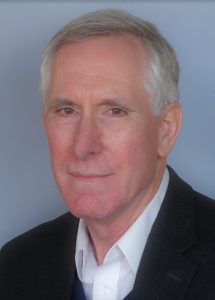HSC honors grad searches for solutions to U.S. military suicides
June 5, 2020 • Uncategorized
 When Bruce Crow, PsyD, MPH, retired after 30 years of active duty as a U.S. Army Colonel and military psychologist, he was still in the prime of his career and seeking answers to one of the biggest problems plaguing those in the uniformed services today – suicide.
When Bruce Crow, PsyD, MPH, retired after 30 years of active duty as a U.S. Army Colonel and military psychologist, he was still in the prime of his career and seeking answers to one of the biggest problems plaguing those in the uniformed services today – suicide.
According to the American Psychological Association, approximately 17 U.S. veterans die every day by suicide, and among active-duty troops, suicide rates are on the rise. Over the past decade, these growing numbers have raised public and professional concerns, with suicide now being the second-leading cause of death in the military.
“In many ways, suicide is not well understood,” Dr. Crow said. “As a clinical psychologist, I was trained to focus on the individual, but there is perspective to be gained by studying the problem from a broader, population health approach, especially as relates to clusters, communities and groups, like those developed among a military base, unit or team.”
Being able to complete an MPH degree online through the HSC School of Public Health provided Dr. Crow with the opportunity to study suicide risk factors and prevention through the population health lens.
A number of important factors can be associated with risk, including social or environmental stressors, relationships, workplace issues, injuries and health conditions, sleep disorders, post-traumatic stress disorder, substance use and others.
Dr. Crow enrolled in HSC’s MPH program while stationed in San Antonio, where he had served as Chief of Behavioral Medicine at Brooke Army Medical Center, completing the program in December 2019.
He now applies his public health training in a senior position with the Department of Veterans Affairs Suicide Prevention Program in Washington, D.C., as Associate Director, Program Evaluation.
Dr. Crow is being honored this year with one of the top School of Public Health graduation awards, for exemplary leadership and service to the school and community.
In an interesting twist, he is no relation to the man for whom the annual SPH award is named – Bob J. Crow, former Amon G. Carter Charitable Foundation Executive Director and member of the Steering Committee founding the SPH in Fort Worth more than 20 years ago – but the two do seem to demonstrate the same values and commitment in their work and contributions to community.
As a clinical psychologist, Dr. Crow’s work addressing uniformed services combat stress control, suicide prevention, life threatening behaviors, soldier shootings and post-incident behavioral health response began in the late 1990s.
For eight years, he served as Clinical Psychology Consultant to the U.S. Army Surgeon General in Washington, D.C., and spent four years as Director of the Warrior Resiliency Program for active duty Army personnel at the Fort Sam Houston military base.
Prior to his position with the VA, he served as Senior Fellow for the Military Suicide Research Consortium at the University of Washington in Seattle.
He is the recipient of numerous awards.
“Being able to complete my MPH demystified public health and showed how the broader components of this approach to the problem of suicide can offer insight to complement and expand what might be done for prevention on an individual basis,” Dr. Crow said.
“While there have been conflicting research findings, it does not appear that suicide is directly related to combat or deployment,” he said, “making it all the more crucial to get to the real issues behind the problem.”
As Dr. Crow and colleagues continue their critical work in this area, he said he is glad to have gained formal public health training and a view of population health that adds to his clinical psychology background.
“Being able to apply the public health perspective has confirmed for me that pursuing my MPH was a good decision; it has opened up new ways of tackling solutions,” he said.

Social media